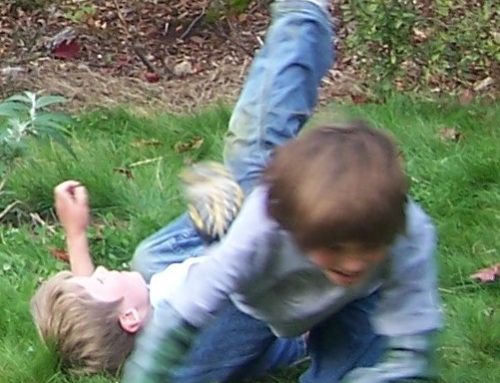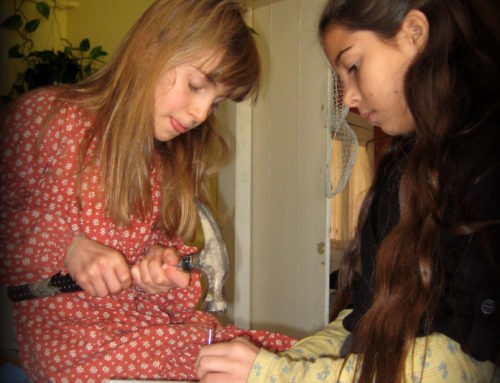One of the worst things about arbitrary authority is it makes us lose our trust in natural authority- people who know what they are doing and could share a lot of wisdom with us. When they make you obey the cruel and unreasonable [authority] they steal your desire to learn from [or listen to] the kind and reasonable [authority]” (Grace Llewellyn, The Teenage Liberation Handbook.)
If we truly take the time to listen and be present with our kids, then maybe we have a greater chance of building relationships of shared power based on mutual respect. We can get out of power struggles and communicate on a constructive level. It’s a lot about staying open, not getting defensive, and really looking for what you or the child needs in the moment and letting go of pre-conceived notions of right and wrong, etc. Ultimately it’s about loving and being loving (to yourself and your children) and learning how to respond in every instance in a loving manner even when there is a need for firmness, directness or protection of some kind.
Teach with Compassion and Education not Harshness and Punishment
I experienced almost the antithesis of this approach in an interaction between Lucas (1 ½) and his father.
Dad said, “Lucas don’t do that!” harshness in his voice. He is very stern and almost mean. How many times have I seen the look of bewilderment in children’s faces, knowing that someone is upset with them but not really knowing why?
Young children are new to the world and lack experience and understanding. Could we not help to educate them and help them to understand the consequences of actions rather than responding with harshness to behavior that does not meet our needs? How do we help teach them what we would like rather than sending the message that they are “wrong” or “bad”.
In my experience, there’s another approach of engagement, which can meet the needs of the parent and is kinder and more effective. It is to engage in a gentle way and kindly direct his activity elsewhere. In this way we seek to educate and redirect, not to induce fear. This is not making him wrong and punishing him for whatever he is doing, but teaching him a new way. I believe this goes not only for children as young as Lucas but for older children as well. Rather than assuming they have done something wrong or are “getting into trouble,” give them the benefit of the doubt and employ kindness and understanding in lovingly (and firmly if necessary) directing their activity in another direction. Harshness just teaches fear, does not cultivate understanding and teaches obedience to authority instead of building self-responsibility.
“Because I’m your Mama”?
Similarly, I overheard:
“because I’m your mama… sometimes he should just do it without an explanation”. My first reaction is sadness, but then I begin to look deeper into why I find such behavior problematic, even with children as young as Lucas (1 ½).
I believe that all children deserve respect, understanding, consideration and love. In such a statement I do not hear those feelings being conveyed. What I hear is a desire for obedience regardless of the feelings needs or perspective of the child, a power-over rather than power-with perspective. Just as does responding with harshness, this is taking away from Lucas an opportunity to learn, to understand and make sense of the world and to be empowered to trust his own experience and build resources to make his own decisions. Instead it is teaching him to rely on and trust authority for answers and to act out of fear of that authority rather than a cultivated understanding of why his action would contribute to his or another’s well-being.
“Because I’m your mama” robs children of the opportunity to really understand or to cultivate knowledge and tools to meet their own needs and make their own decisions. Dr. Gordon writes “Parents of very young children often think that just because these children are dependent on adults for many of their needs, infants and toddlers have very little capacity to work out their own solutions to problems they encounter early in life. This too, just isn’t so.” Even at a young age I think it is important to respond with compassion and gentle explanation because without that a self-trust and curiosity is diminished and, by the time a child is old enough to demonstrate full understanding, he may be closed off to listening. Marshall Rosenberg writes that… pretty soon, in a relationship based on coercion or power over, all one starts hearing is demands and is not open to hear the wisdom or suggestion of others.


Leave A Comment